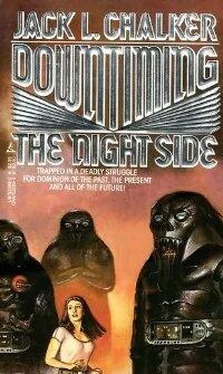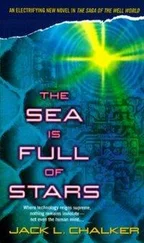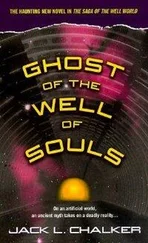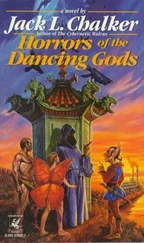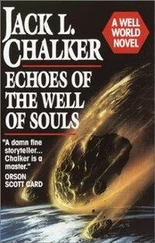Jack Chalker - Downtiming the Night Side
Здесь есть возможность читать онлайн «Jack Chalker - Downtiming the Night Side» весь текст электронной книги совершенно бесплатно (целиком полную версию без сокращений). В некоторых случаях можно слушать аудио, скачать через торрент в формате fb2 и присутствует краткое содержание. Год выпуска: 1985, ISBN: 1985, Издательство: Tor Books, Жанр: Фантастика и фэнтези, на английском языке. Описание произведения, (предисловие) а так же отзывы посетителей доступны на портале библиотеки ЛибКат.
- Название:Downtiming the Night Side
- Автор:
- Издательство:Tor Books
- Жанр:
- Год:1985
- ISBN:0-812-53288-0
- Рейтинг книги:3 / 5. Голосов: 1
-
Избранное:Добавить в избранное
- Отзывы:
-
Ваша оценка:
- 60
- 1
- 2
- 3
- 4
- 5
Downtiming the Night Side: краткое содержание, описание и аннотация
Предлагаем к чтению аннотацию, описание, краткое содержание или предисловие (зависит от того, что написал сам автор книги «Downtiming the Night Side»). Если вы не нашли необходимую информацию о книге — напишите в комментариях, мы постараемся отыскать её.
Downtiming the Night Side — читать онлайн бесплатно полную книгу (весь текст) целиком
Ниже представлен текст книги, разбитый по страницам. Система сохранения места последней прочитанной страницы, позволяет с удобством читать онлайн бесплатно книгу «Downtiming the Night Side», без необходимости каждый раз заново искать на чём Вы остановились. Поставьте закладку, и сможете в любой момент перейти на страницу, на которой закончили чтение.
Интервал:
Закладка:
Moosic nodded. “That’s the first priority now. Central control will have a permanent override elsewhere, connected directly to this place. We received funding for it.” He didn’t mention that it would take ten weeks to install even the basics, six months before it could be fully tested and operational. Riggs no longer had a need to know that sort of thing.
They got their red tags and went on down the corridor. “This place is as bad as Fort Meade,” the newcomer remarked as they passed Marine after Marine, computer check and trap after computer check and trap. “Maybe it’s about time you told me what we do here.”
Riggs chuckled. “They didn’t tell you, huh? Well, it wouldn’t matter. Nobody would believe it anyway, not even if we let the Washington Post in and they made it a page-one cover story. You know this plant doesn’t generate any public electricity?”
Moosic nodded. “I figured that out from the problem they handed me and a close look at the place. But it’s in full operation.”
“Oh, yeah. More than ever. Close to a hundred percent capacity. It takes one hell of a lot of juice to send people back in time.”
Ron Moosic stopped dead. “To… what?”
Riggs stopped, turned, and looked highly amused. Moosic had the uneasy feeling he was having his leg pulled. “Come on—seriously.”
“Oh, I’m serious. I just get a kick out of seeing anybody’s face when I tell ’em that. Come on down to the lab levels and I’ll see if anybody’s free enough to show you the works.”
Dr. Aaron Silverberg was a big bear of a man with a wild lion’s mane of snow-white hair and penetrating black eyes. He was not only physically imposing; he had that deep-down egotism that assumed that everybody he met had not only heard of him but was also awestruck at his very presence. Ron Moosic, of course, had never heard of him before in his life.
“To tell you how we happened on it would take far too long,” the chief scientist told him. “It was the usual— one of those accidents that happened when some folks were doing something totally unrelated. Basically, a few odd random particles in the big accelerator out west consistently arrived before they left when you did things just so. Only a few quadrillionths of a second, of course, but it shouldn’t have been possible at all. The first thought was that something had finally broken the speed limit—the speed of light. Later, using various shieldings, we found that light had nothing at all to do with it. The damned things arrived before they left, that’s all. Knocked causality into a cocked hat all at once. For those of us who knew about it, it was more gut-wrenching than if God wearing a long beard and flowing robes had parted the heavens in front of us.”
Over the next half-hour Moosic spent a good deal of time looking at evidence of trips back in time, mostly photographs and small objects. There were already a huge number of more elaborate things—a tape of one of the Lincoln-Douglas debates, several of tavern conversations between Franklin and Jefferson as well as many others of the founding fathers, and others recording personages who’d lived even earlier. The earliest was an eavesdropped argument between an incensed Christopher Columbus and the refitter of the Santa Maria, or so he was assured. He spoke no Spanish, let alone fifteenth-century Aragonese with a thick, equally archaic Italian accent.
“Funny,” Silverberg commented. “Nobody ever plays Franklin with a New England accent, although he came from Boston, not Philadelphia, and nobody ever gave Jefferson that hill country twang he really has. Had. Whatever. Napoleon had a silly voice and never lost his Corsican accent. If they’d had television back then, he’d never have made it in politics.”
Moosic just shook his head in wonder, still not quite believing all this. “I find it all impossible to accept. What was was, that’s all. You can’t recapture a moment that’s past.”
“And so I was raised to believe. As the poor two-dimensional creature in Abbott’s Flatland could not accept depth, so we cannot accept but a single perspective of time. In a way, it’s like motion. We know we’re in motion because of a lot of phenomena and reference points. We move in relation to something else. Yet the Earth is now turning at around twenty-five thousand miles per hour and we can’t feel it. It’s going around the sun at an even greater speed, and we can’t feel or sense that, either. The sun, in turn, is going around the galactic center, and so on. Since all that is around us, including us, is moving at the same speed and in the same way, we cannot sense that motion and speed relative to us. Since we are going forward in time, all of us at the same rate and everything else around, we cannot really relate to time in any way except as the progress of one moment to the next. But it’s all there—the past is forever. We are immortal, Mr. Moosic. We exist forever frozen in our past moments.”
“But time is… immutable.”
“Oh, so? Even before we knew that it was not so. Einstein showed it. Time is relative to mass and velocity. The closer you approach the speed of light, the slower your time is relative to the universe. Time also gives way around areas of heavy gravity—suns, to a small extent, and black holes to an enormous extent. No, it’s not the fact that time is malleable that is the stunner. Apply enough power, it seems, and time will finally give. Rather, the shock is that time exists as a continuum, a series of events running in a continous stream from the Big Bang all the way to the future. How far we don’t know—we can’t figure out how to go into the future relative to our own time. It may be possible that far future scientists can go past today, but we cannot. But the past record is there, and it is not merely a record: it’s a reality. Now you understand the need for security.”
He nodded, stunned. “You could send an army back and have it pop up out of nowhere.”
“ Bah! You’re hopeless! Mr. Moosic, you will never send an army back in time. We need the entire capacity of this power plant, which is capable of supplying the energy needs of roughly ten million people, just to send four people back a century, and the further back you go, the more power is required. To get one human being back to 1445 would require our total output. That and to sustain him there, anyway, for any period of time. Beyond that the energy requirements get so enormous that we’ve estimated that just to send one person back to the first century A.D. would require every single bit of power this nation could generate for three solid weeks.”
“But for only, say, a week back? Surely—”
“No, no. It’s impossible. Physics is still physics and natural law is still natural law. Just as nothing is permitted past the speed of light, no one is permitted to coexist at any point in the past where he already exists. It just won’t do it. In fact, it won’t do it within a decade of your birth date. Why we haven’t any idea.”
He thought about it, trying to accept it at least for argument’s sake. “A decade. Then you could go back and live past the time you were born.”
“No. Not exactly, that is. You could go back, yes, but by that time you wouldn’t be you anymore. Nature does resist tampering. We made that discovery the first time out. You’re back there, and you don’t fit. Time then makes you fit. It is far easier and more efficient to integrate you into that present you’re now in than it is to change all time. It creates a curious niche for you. It adjusts a very small thing in what we call the time frame so that you were born and raised there. In a way, it’s very handy. Go back to fifteenth-century France and you’ll find yourself thinking in the local language and dialect and generally knowing your way around. Only the massive energy link, a lifeline of sorts, between here and there keeps you from being completely absorbed. Unfortunately, the longer you are there, the more energy is required to sustain you. It’s in some way related to the subject’s age, although we haven’t gotten the exact ratio. It requires more energy to send an older person back than a younger. Someone up to about the age of fifty we can generally sustain back there for the number of time-frame days equal to half his age. How old are you?”
Читать дальшеИнтервал:
Закладка:
Похожие книги на «Downtiming the Night Side»
Представляем Вашему вниманию похожие книги на «Downtiming the Night Side» списком для выбора. Мы отобрали схожую по названию и смыслу литературу в надежде предоставить читателям больше вариантов отыскать новые, интересные, ещё непрочитанные произведения.
Обсуждение, отзывы о книге «Downtiming the Night Side» и просто собственные мнения читателей. Оставьте ваши комментарии, напишите, что Вы думаете о произведении, его смысле или главных героях. Укажите что конкретно понравилось, а что нет, и почему Вы так считаете.
